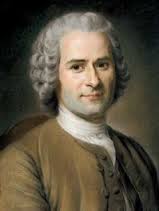
1712-1778
"Man is free, and everywhere he is in chains."-On the Origin of the Inequality of Mankind
Rousseau’s political philosophy became the foundation for much criminal ideology reform. He proclaimed that in the very beginning of humankind, before humans gathered together into societies and established property lines, all humans and their innate instincts were good. He called this the "State of Nature." Rousseau came to this conclusion by looking at the society of his time and acknowledging the mass quantities crime, hatred and divisions between people. This is proof, he claims, that humans are not made to live together, because otherwise there would not be any problems of that kind. Social problems show the need for government, which Rousseau defined in his book The Social Contract by the concept of the "social contract." Citizens of a state sacrifice some absolute freedom in order to have security and peace, but the state must be a cooperative entity. The book challenged the divine power of monarchs, called for a more democratic-style government, and declared that all men have natural rights. This revolutionary line of thought influenced many Enlightenment thinkers into calling for reform in the penal system on the basis that all men have rights which were being abused by the harsh Bloody Code.

